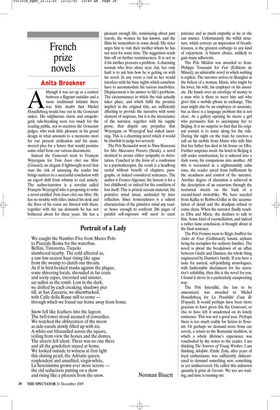French prize novels
Anita Brookner
Although it was set up as a contest between a flagrant outsider and a more traditional intimist there was little doubt that Michel Houellebecq would lose out in the Goncourt stakes. His sulphurous vision and unapologetic rule-breaking were too much for the reading public, not to mention the Goncourt judges, who took little pleasure in his grand design in what amounts to a memento mori for our present civilisation and his unanswered plea for a future that would promise some relief from our various discontents.
Instead the Goncourt went to François Weyergans for Trois Jours chez ma Mère (Grasset), an elegant if lightweight novel that runs the risk of annoying the reader but brings matters to a successful conclusion with an expert shift from whimsy to real anxiety. The author/narrator is a novelist called François Weyergraf who is proposing to write a novel entitled Trois Jours chez ma Mère. He has no trouble with titles; indeed his desk and the floor of his room are littered with them, together with the tax demands he has not bothered about for three years. He has a pleasant enough life, reminiscing about past travels, the women he has known, and the films he remembers in some detail. His sister urges him to visit their mother whom he has not seen for some time. The suggestion sends him off on further reminiscences. It is not as if his mother presents a problem. A charming woman who lives alone near Aix, her only fault is to ask him how he is getting on with his novel. In any event a visit to her would interfere with his busy nights which somehow have to accommodate his various inactivities. Displacement is his answer to life’s problems. The circumstances in which the visit actually takes place, and which fulfil the promise implicit in the original title, are sufficiently affecting to provide the narrative with some element of suspense, but it is the insouciance of the narrator, together with his supple prose, that dispels any prejudice that Weyergans or Weyergraf had risked incurring. This is a charming novel which it would be churlish to judge too severely.
The Prix Renaudot went to Nina Bouraoui for Mes Mauvaises Pensées (Stock), a novel destined to arouse either sympathy or detestation. Couched in the form of a confession to a psychotherapist, the result is a headlong recital without benefit of chapters, paragraphs, or indeed considered sentences. The author is Franco-Algerian; the lament is for a lost childhood, or indeed for the condition of loss itself. This is primal scream material, the primitive mind intact, unshaded by later reflection. Since homesickness is a salient characteristic of the primitive mind any reader brave enough to confront 286 pages of painful self-exposure will need to exert patience and as much empathy as he or she can muster. Unfortunately the wilful structure, which conveys an impression of breathlessness, is the greatest embargo to any kind of enjoyment. A bizarre choice, unlikely to gain many adherents.
The Prix Médicis was awarded to JeanPhilippe Toussaint for Fuir (Editions de Minuit), an admirable novel in which nothing is explicit. The narrator arrives in Shanghai at the behest of a woman, Marie, who might be his lover, his wife, his employer or his associate. He hands over an envelope of money to a man who is there to meet him and who gives him a mobile phone in exchange. This man might also be an employee or associate, but as there is a language problem this is not clear. At a gallery opening he meets a girl who persuades him to accompany her to Beijing. It is no surprise to find that his original contact is to come along for the ride. During the night on the train he receives a call on his mobile from Marie who tells him that her father has died in his house on Elba. Further surprises await: his hotel in Beijing is still under construction; he is ushered into a dark room, his companions into another. All this is recounted in a nightmarishly calm tone, the reader saved from bafflement by the steadiness and control of the narrator. Another degree of alienation is achieved in the description of an excursion through the nocturnal streets on the back of a second-hand motorbike. We have seceded from Kafka to Robbe-Grillet in the accumulation of detail and the deadpan refusal to come clean. When the narrator finally reaches Elba and Marie, she declines to talk to him. Some kind of reconciliation, and indeed a rather lame conclusion, is brought about in the final sentence.
The Prix Femina went to Régis Jauffret for Asiles de Fous (Gallimard), lunatic asylums being his metaphor for ordinary families. The novel is about the breakdown of an affair between Gisèle and Damien, the whole thing engineered by Damien’s family. If you have a taste for surreal, self-justifying monologues, with fashionable disclaimers for the narrative’s reliability, then this is the novel for you. I found it clever in a particularly exasperating way.
The Prix Interallié, the last to be announced, was awarded to Michel Houellebecq for La Possibilité d’une Ile (Fayard). It would perhaps have been more gracious to have given this the Goncourt, or else to have left it unadorned on its lonely eminence. This was not a good year. Perhaps there is too much reality for fiction to flourish. Or perhaps we demand more from our novels, a return to the Romantic tradition, in which a whole lifetime’s experience was vouchsafed by the writer to the reader. I am thinking The Sorrows of Young Werther, I am thinking Adolphe. Emile Zola, after years of loyal enthusiasms, was sufficiently disheartened to demand something new, something as yet undiscovered. He called this unknown quantity le génie de l’avenir. We too are waiting, and time is running out.

















































 Previous page
Previous page